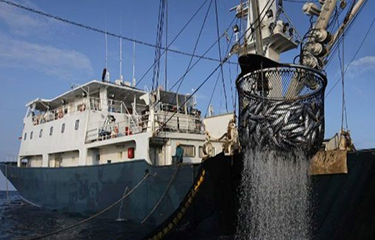The Indian Ocean Tuna Commission (IOTC) has once again failed to reach an agreement on new skipjack or yellowfin quotas, or on managing drifting fish aggregating devices (dFADs), two issues that have stymied cooperation among its members and resulted in calls for new management methods.
The 27th session of the IOTC, held from 8 to 12 May in Mauritius, reached agreements on monitoring measures, how it responds to violations of its management measures, and on bigeye tuna quota. Those successes were largely overshadowed by yet another set of failures on dFADs and yellowfin and skipjack quotas.
Failure to rectify yellowfin tuna quotas continues a now long-standing issue within the regional fishery management organization (RFMO). The IOTC adopted a resolution in June 2021 to rebuild the yellowfin tuna stock, but five contracting parties – Oman, Iran, India, Madagascar, and Indonesia – objected to the resolution. As a result, these parties have not experienced restrictions that came with the reduced quotas, as under the rules of the IOTC any objecting party is exempt from any requirement in an agreement.
Lack of an agreement continues to put the stock at risk. In February 2022, the IOTC Scientific Committee published a report on the yellowfin tuna stock assessment in the Indian Ocean. The report showed the stock remained overfished, and required a catch reduction of at least 30 percent to achieve a preferred population.
Additionally, at the IOTC’s May 2022 meeting, member parties failed to agree to skipjack catch reductions necessary to implement annual quotas stemming from its own harvest control rule. The commission called on members who caught more than 80,000 MT in 2020 to reduce their catch by 9 percent, those who caught between 30,000 MT and 80,000 MT to reduce catch by 6 percent, and those who caught below 30,000 MT to reduce catch volumes by 4 percent. The reductions don’t apply to least-developed countries, which can implement the catch reduction progressively.
Glen Holmes, a senior officer with The Pew Charitable Trusts’ International Fisheries Program, who attended the meeting, lamented the IOTC’s continued failure to reach a compromise on management of yellowfin and skipjack tuna.
“Yellowfin has been overfished for nearly a decade, and the continued lack of agreed action is extremely concerning,” he said. “Skipjack tuna, which is experiencing overfishing, has also been caught in protracted disagreements around who should be able to catch how much for many years, and the further delays in effective management will continue to make the situation worse for both stocks.”
Lack of compromise on issues continues to plague the IOTC in other areas, highlighted by the RFMO failing to meet any agreement on dFADs.
At a contentious special session of the Indian Ocean Tuna Commission (IOTC) in February 2023, developing nations bucked pressure from the E.U. and approved an annual closure period for dFADs. Several IOTC members, including the E.U., lodged objections that would exempt them from the measure.
This commission meeting was a chance to forge a compromise and gain unanimous approval. The E.U. put forward a proposal that would delay the start of the new dFAD rule and refer the issue to the IOTC Scientific Committee, which would also make less drastic cuts in dFAD numbers. It did not receive approval.
The International Pole and Line Foundation (IPNLF) and the Blue Marine Foundation both said they were disappointed by the continued lack of any action of dFADs, and the organizations were particularly critical of the E.U.’s stance on use of the devices in the Indian Ocean.
“The inconsistent position of the E.U. on the management of dFADs in the Indian Ocean remains puzzling. Drifting FAD closures or fishing closures have been implemented in all the other tropical tuna RFMOs – WCPFC, ICCAT, and IATTC – with the support of the E.U.,” the organizations wrote in a release.
The bloc’s objections and requests for more information from the IOTC Scientific Committee, in light of the E.U.’s support of other closures, don’t make sense.
“These closures were applied on a precautionary basis to rebuild stocks in these regions,” the two organizations said. “In the Indian Ocean, the E.U. continues to cite ‘a lack of scientific evidence’ as an excuse to delay implementing closures.”
Blue Marine Foundation Head of Investigations Jess Rattle called the E.U.’s continued stance “blatant hypocrisy.”
“The E.U. is happy to go along with FAD closure periods in other oceans with far healthier stocks, but not in the Indian Ocean where its purse-seine fleet does most of its fishing,” Rattle said.
The Global Tuna Alliance (GTA), based in Haarlem, the Netherlands; the Tuna Protection Alliance (TUPA), a project of Earthworm France, based in Lille; and the WWF, based in Vaud, Switzerland, all issued a joint report before the meeting criticizing the dysfunctionality of the IOTC.
“The Indian Ocean Tuna Commission (IOTC) agreement currently allows members to opt out of any measure at their will, with no justification and consequences,” the report said. “This is greatly limiting the ability of the IOTC to implement responsible fisheries management. The Global Tuna Alliance (GTA), Tuna Protection Alliance (TUPA), WWF, and participating market partners call on IOTC members to revise the IOTC agreement to remove this weak, unhelpful, and outdated objection procedure.”
The IOTC’s own compliance committee has expressed concern with low levels of compliance regarding the commission’s regulations at its May 2022 meeting. At the time, the committee observed that there were low levels of compliance with a resolution covering mandatory statistical reporting requirements, and another covering shark conservation.
Despite the high-profile failures, the IOTC did manage progress in other areas. The RFMO established new ...
Photo courtesy of Alex Hofford/International Pole and Line Foundation








